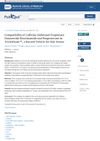 48 citations,
October 2011 in “Sports Medicine”
48 citations,
October 2011 in “Sports Medicine” Ice-skating athletes often have skin problems due to cold, infections, and inflammation, needing careful treatment and prevention.
 2 citations,
January 1908 in “Journal of the American Medical Association”
2 citations,
January 1908 in “Journal of the American Medical Association” Fear of hair-related issues causes significant mental distress, especially in high-stress women.
 January 2018 in “Elsevier eBooks”
January 2018 in “Elsevier eBooks” The document concludes that proper diagnosis and treatment of follicular disorders are crucial, with specific treatments for conditions like acne, drug-induced eruptions, and rosacea.

Modern hair restoration techniques can effectively treat hair loss and provide natural-looking results.
 153 citations,
October 2012 in “Skin Pharmacology and Physiology”
153 citations,
October 2012 in “Skin Pharmacology and Physiology” Caffeine in cosmetics may reduce cellulite, protect skin, and stimulate hair growth, but more research is needed on its use and effects.
 60 citations,
May 2014 in “British Journal of Dermatology”
60 citations,
May 2014 in “British Journal of Dermatology” Caffeine affects hair growth and health differently in men and women.
 46 citations,
January 2008 in “Journal of cosmetic dermatology”
46 citations,
January 2008 in “Journal of cosmetic dermatology” Caffeine and siloxanetriol alginate caffeine in emulsion form can reduce fatty cell size and number, potentially treating cellulite effectively.
 35 citations,
January 2018 in “Skin pharmacology and physiology”
35 citations,
January 2018 in “Skin pharmacology and physiology” Nanoemulsion creams with certain enhancers can greatly increase caffeine delivery through skin.
 35 citations,
June 2017 in “Pharmaceutical research”
35 citations,
June 2017 in “Pharmaceutical research” Researchers developed a model that shows hair follicles increase skin absorption of caffeine by 20%.
 32 citations,
December 2017 in “Journal of Drug Delivery Science and Technology”
32 citations,
December 2017 in “Journal of Drug Delivery Science and Technology” Minoxidil and caffeine in transfersomes improve hair growth treatment.
 31 citations,
February 2019 in “International Journal of Cosmetic Science”
31 citations,
February 2019 in “International Journal of Cosmetic Science” Caffeine applied to the scalp can protect hair follicles from UV damage.
 21 citations,
January 2017 in “Skin Pharmacology and Physiology”
21 citations,
January 2017 in “Skin Pharmacology and Physiology” Caffeine-based liquid 0.2% is as effective as minoxidil 5% for treating male hair loss.
 12 citations,
April 2020 in “British Journal of Dermatology”
12 citations,
April 2020 in “British Journal of Dermatology” Caffeine may help reduce stress-induced hair loss.
 11 citations,
January 2012 in “International Journal of Trichology”
11 citations,
January 2012 in “International Journal of Trichology” Caffeine may help hair growth in hereditary hair loss.
 8 citations,
April 2020 in “European Journal of Nutrition”
8 citations,
April 2020 in “European Journal of Nutrition” Newborns' hair shows how much caffeine their mothers drank during pregnancy.
 7 citations,
July 2018 in “International Journal of Applied Pharmaceutics”
7 citations,
July 2018 in “International Journal of Applied Pharmaceutics” Chitosan nanoparticles are promising for sustained caffeine delivery through the skin.
 5 citations,
January 2020 in “Journal of Dermatology and Dermatologic Surgery”
5 citations,
January 2020 in “Journal of Dermatology and Dermatologic Surgery” Caffeine may benefit skin and hair health but more research is needed to confirm its effectiveness in dermatology.
2 citations,
January 2022 in “Materials today: proceedings” Caffeine may be good for hair growth and skin care because it binds well with keratin.
 1 citations,
August 2020 in “British Journal of Dermatology”
1 citations,
August 2020 in “British Journal of Dermatology” Caffeine may protect hair follicles from stress-related hair loss.
 1 citations,
July 2017 in “Journal der Deutschen Dermatologischen Gesellschaft”
1 citations,
July 2017 in “Journal der Deutschen Dermatologischen Gesellschaft” Topical caffeine improves hair loss intensity, speed, and shedding, and works better with minoxidil/azelaic acid.
1 citations,
February 2020 in “PubMed” The topical solution improved hair density and appearance in men with androgenetic alopecia.
 December 2024 in “http://isrctn.com/”
December 2024 in “http://isrctn.com/” MpowerTM may improve hair growth and satisfaction more than plain minoxidil, with mild side effects.
 November 2024 in “International Journal of Molecular Sciences”
November 2024 in “International Journal of Molecular Sciences” Nanoparticles may improve caffeine delivery for hair growth, offering a potential alternative to minoxidil for hair loss treatment.
 May 2024 in “Journal of cosmetic dermatology”
May 2024 in “Journal of cosmetic dermatology” A shampoo with caffeine and adenosine may help prevent hair loss and thicken hair.

TrichoFoam™ is a stable option for personalized hair loss treatment with most ingredients remaining effective for 90-180 days.
 November 2023 in “Journal of Cosmetic Dermatology”
November 2023 in “Journal of Cosmetic Dermatology” The topical treatment with caffeine and Procapil 3% improved male pattern hair loss and was well tolerated after 12 weeks.
 September 2023 in “Journal of The American Academy of Dermatology”
September 2023 in “Journal of The American Academy of Dermatology” Caffeine may help hair grow better.

Cinchona succirubra extract with caffeine reduces hair loss and strengthens hair.
 April 2023 in “Journal of Investigative Dermatology”
April 2023 in “Journal of Investigative Dermatology” Cinchona succirubra extract with caffeine improves hair growth and reduces hair loss.
 July 2022 in “http://isrctn.com/”
July 2022 in “http://isrctn.com/” Adding a cosmetic gel with caffeine, taurine, and growth factors to standard hair loss treatments could improve results.




























